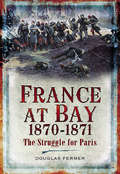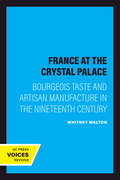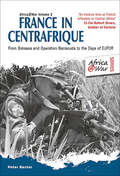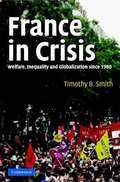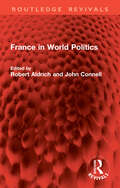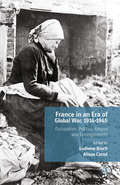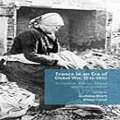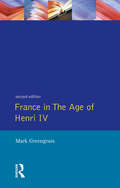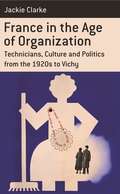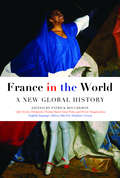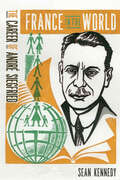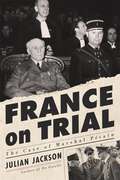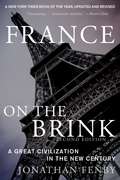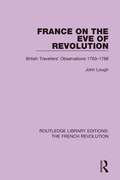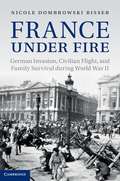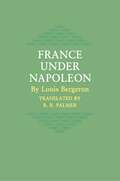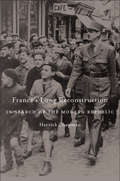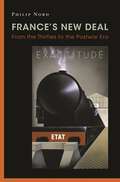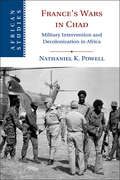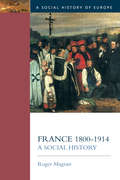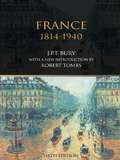- Table View
- List View
France and the Second World War: Resistance, Occupation and Liberation
by Peter DaviesFrance and the Second World War is a concise introduction to a crucial and controversial period of French history - world war and occupation. During World War Two, France had the dramatic experience of occupation by the Germans and the legacy of this traumatic time has lived on until today, to the enduring fascination of historians and students. France and the Second World War provides a fresh and balanced insight into the events of this era of conflict, exploring the key themes of:* Occupation as a social, economic and political phenomenon* the Vichy regime and the politics of collaboration* the 'resistance', resistors and its ideology* the liberation* the legacy of the wartime period.
France and the Spanish Civil War: Cultural Representations of the War Next Door, 1936–1945
by Martin HurcombeIn this wide-ranging study of French intellectuals who represented the Spanish Civil War as it was happening and in its immediate aftermath, Martin Hurcombe explores the ways in which these individuals addressed national anxieties and shaped the French political landscape. Bringing together reportage, essays, and fiction by French supporters of Franco's Nationalists and of the Spanish Republic, Hurcombe shows the multifaceted ways in which that conflict impacted upon French political culture. He argues that French cultural representations of the war often articulated a utopian image of the Nationalists or of the Spanish Republic that served as models behind which the radical right or the radical left in France might mobilise. His book will be of interest not only to scholars of French literature and culture but also to those interested in how events unfolding in Spain found an echo in the political landscapes of other countries.
France at Bay, 1870–1871: The Struggle for Paris
by Douglas FermerThe Franco-Prussian War did not end with the catastrophic French defeat at Sedan on 1 September 1870 when an entire French army surrendered, the Emperor Napoleon III was captured and his regime collapsed. The war went on for another five agonizing months, and resolved itself into a contest for Paris—for while Paris held out, France was undefeated. The story of this dramatic final phase of the war is the subject of Douglas Fermers masterly account, the sequel to his Sedan 1870. He weaves this story of military victory and defeat into a gripping narrative and it sets the extraordinary events of nearly 150 years ago in the wider context of European history.
France at the Crystal Palace: Bourgeois Taste and Artisan Manufacture in the Nineteenth Century
by Whitney WaltonWhitney Walton approaches the nineteenth-century French industrial development from a new perspective—that of consumption. She analyzes the French performance at the Crystal Palace Exhibition of 1851 to illustrate how bourgeois consumers influenced France's distinctive pattern of industrial development. She also demonstrates the importance of consumption and gender in class formation and reveals how women influenced industry in their role as consumers.Walton examines important consumer goods industries that have been rarely studied by historians, such as the manufacture of wallpaper, furniture, and bronze statues. Using archival sources on household possessions of the Parisian bourgeoisie as well as published works, she shows how consumers' taste for fashionable, artistic, well-made furnishings and apparel promoted a specialization unique to nineteenth-century France.
France before 1789: The Unraveling of an Absolutist Regime
by Jon ElsterA masterful new account of old regime France by one of the world's most prominent political philosophersFrance before 1789 traces the historical origins of France's National Constituent Assembly of 1789, providing a vivid portrait of the ancien régime and its complex social system in the decades before the French Revolution. Jon Elster writes in the spirit of Alexis de Tocqueville, who described this tumultuous era with an eye toward individual and group psychology and the functioning of institutions. Whereas Tocqueville saw the old regime as a breeding ground for revolution, Elster, more specifically, identifies the rural and urban conflicts that fueled the constitution-making process from 1789 to 1791. He presents a new approach to history writing, one that supplements the historian's craft with the tools and insights of modern social science. Elster draws on important French and Anglo-American scholarship as well as a treasure trove of historical evidence from the period, such as the Memoirs of Saint-Simon, the letters of Madame de Sévigné, the journals of the lawyer Barbier and the bookseller Hardy, the Remonstrances of Malesherbes, and La Bruyère's maxims.Masterfully written and unparalleled in scope, France before 1789 is the first volume of a trilogy that promises to transform our understanding of constitution making in the eighteenth century. Volume 2 will look at revolutionary America in the years leading up to the Constitutional Convention of 1787 while the third volume will examine all facets of the French and American assemblies, from how they elected their delegates and organized their proceedings to how they addressed issues of separation of powers and representation.
France in Centrafrique: From Bokassa and Operation Barracude to the Days of EUFOR (Africa at War)
by Peter BaxterFrance in Centrafrique explores the pre- and post-colonial history of the Republic of Central Africa as well as giving the reader a taste of the country's involvement in WWII itself. The main focus of this volume is on Central Africa's independence and the rise to power of Jean Bedel Bokassa including the Focard network and Françafrique connections, France's military links with RCA (defense agreements), the republic's post independence military, its politics and Bokassa's coup. It takes a staggering look at Central Africa under Bokassa's leadership and the ensuing break down in its relationship with France. Operation Baracuda was the natural culmination of that soured relationship and in this book de Cherisey examines "France's last colonial expedition", the planning of the operation, its players, a step-by-step breakdown and its outcome. To bring the reader up to speed with the RCA de Cherisey discusses the years after Bokassa, a new political rule, the effects on the army and the relationship with France all the way to Operation Almandin I, II and III. France's involvement in the RCA is deep-seated and ongoing. This book concludes with a look at Operation Boali, Bozizé's coup and the international fallout in terms of further intervention both from France and the EUFOR. Peter Baxter is an author, amateur historian and African field, mountain and heritage travel guide. Born in Kenya, Peter has lived and travelled over much of southern and central Africa. He was educated in Rhodesia (Zimbabwe), leaving the country after independence for an extended bout of travel before returning in 1989. Since then he has guided in all the major mountain ranges south of the equator, helping develop the concept of sustainable travel, and the touring of battlefield and heritage sites in East Africa. Peter lives in the United States, working on the marketing of African heritage travel as well as a variety of book projects. His interests include British Imperial history in Africa and the East Africa campaign of the First World War in particular. He is married with three children.
France in Crisis: Welfare, Inequality, and Globalization Since 1980
by Timothy B. SmithTimothy Smith argues that the French economic and social model is imploding on itself despite good intentions.
France in World Politics (Routledge Revivals)
by Robert Aldrich John ConnellOriginally published in 1989, this book analyses France’s distinctive role in international affairs and examines the characteristics of French foreign policy in the Fifth Republic. The introduction provides an overview of France’s role in international relations, then specific chapters look at topics such as French military strategy and relations with the superpowers of the late 20th Century; France and the European Community; immigrant workers and their impact on France’s international presence and France & Africa, among others. The final chapter discusses the evolution and formulation of French foreign policy in historical perspective. The contributors were historians, geographers and specialists in French civilization, all with experience in France. Each chapter includes notes and references to work in both English and French, making the book an important source, especially for students of politics, international relations, modern history and French studies
France in an Era of Global War, 1914-1945: Occupation, Politics, Empire and Entanglements
by A. Carrol L. BrochIn France in an Era of Global War, scholars re-examine experiences of French politics, occupation, empire and entanglements with the Anglophone world between 1914 and 1945. In doing so, they question the long-standing myths and assumptions which continue to surround this period, and offer new avenues of enquiry.
France in an Era of Global War, 1914–1945
by Ludivine BrochIn France in an Era of Global War, scholars re-examine experiences of French politics, occupation, empire and entanglements with the Anglophone world between 1914 and 1945. In doing so, they question the long-standing myths and assumptions which continue to surround this period, and offer new avenues of enquiry.
France in the Age of Henri IV: The Struggle for Stability (Studies In Modern History)
by Mark GreengrassThis study was the first systematic attempt to reach behind the myth of Henri IV - famous for having brought order to France after long civil war - and explores the reality of his achievement. This Second Edition has been substantially updated.
France in the Age of Organization: Factory, Home and Nation from the 1920s to Vichy (Berghahn Monographs in French Studies #11)
by Jackie ClarkeIn interwar France, there was a growing sense that ‘organization’ was the solution to the nation’s perceived social, economic and political ills. This book examines the roots of this idea in the industrial rationalization movement and its manifestations in areas as diverse as domestic organization and economic planning. In doing so, it shows how experts in fields ranging from engineering to the biological sciences shaped visions of a rational socio-economic order from the 1920s to Vichy and beyond.
France in the Enlightenment
by Arthur Goldhammer Daniel RocheA panorama of a whole civilization, a world on the verge of cataclysm, unfolds in this work by Daniel Roche. The text brings the Old Regime to life by showing how its institutions operated and how they were understood by the people who worked within them.
France in the World: A New Global History
by Stephane Gerson Patrick BoucheronThis dynamic collection presents a new way of writing national and global histories while developing our understanding of France in the world through short, provocative essays that range from prehistoric frescoes to Coco Chanel to the terrorist attacks of 2015.Bringing together an impressive group of established and up-and-coming historians, this bestselling history conceives of France not as a fixed, rooted entity, but instead as a place and an idea in flux, moving beyond all borders and frontiers, shaped by exchanges and mixtures. Presented in chronological order from 34,000 BC to 2015, each chapter covers a significant year from its own particular angle--the marriage of a Viking leader to a Carolingian princess proposed by Charles the Fat in 882, the Persian embassy's reception at the court of Louis XIV in 1715, the Chilean coup d'état against President Salvador Allende in 1973 that mobilized a generation of French left-wing activists.France in the World combines the intellectual rigor of an academic work with the liveliness and readability of popular history. With a brand-new preface aimed at an international audience, this English-language edition will be an essential resource for Francophiles and scholars alike.
France in the World: The Career of André Siegfried
by Sean M. KennedyAndré Siegfried (1875–1959) was a leading figure in French academic and cultural life for over five decades. A world traveller who trained as a geographer, Siegfried became a leading political scientist and prominent newspaper columnist. As a long-time professor at Sciences Po, he shaped generations of his country’s elite. France in the World explores the life and career of André Siegfried. An innovator in the field of political science, he established himself as France’s leading interpreter of the English-speaking world. Often likened to Alexis de Tocqueville, Siegfried published influential studies of the United States, Canada, Great Britain, and New Zealand, striving to understand France’s place in a changing global context. Siegfried was a cosmopolitan promoter of liberalism and individual freedom. But at the same time he perceived France to be the core of a Western civilization whose leadership and values were threatened by Americanization, anti-imperial nationalism, and non-white immigration. By following Siegfried’s long career and examining the breadth of his writings, Sean Kennedy shows how his racial and ethnic essentialism was a unifying aspect of his life’s work. That these ideas were considered unremarkable for most of his lifetime offers a powerful illustration of how racist thinking permeated mainstream French republicanism.Exploring the many facets of Siegfried’s career, France in the World examines the entanglement of liberal and racist thinking during an era that witnessed political extremism and a rapidly changing international order.
France on Trial: The Case of Marshal Pétain
by Julian JacksonFor three weeks in July 1945 all eyes were fixed on a humid Paris, where France’s disgraced former head of state was on trial, accused of masterminding a plot to overthrow democracy. Would Philippe Pétain, hero of Verdun, be condemned as the traitor of Vichy?In the terrible month of October 1940, few things were more shocking than the sight of Marshal Philippe Pétain—supremely decorated hero of the First World War, now head of the French government—shaking hands with Hitler. Pausing to look at the cameras, Pétain announced that France would henceforth collaborate with Germany. “This is my policy,” he intoned. “My ministers are responsible to me. It is I alone who will be judged by History.”Five years later, in July 1945, after a wave of violent reprisals following the liberation of Paris, Pétain was put on trial for his conduct during the war. He stood accused of treason, charged with heading a conspiracy to destroy France’s democratic government and collaborating with Nazi Germany. The defense claimed he had sacrificed his personal honor to save France and insisted he had shielded the French people from the full scope of Nazi repression. Former resisters called for the death penalty, but many identified with this conservative military hero who had promised peace with dignity.The award-winning author of a landmark biography of Charles de Gaulle, Julian Jackson uses Pétain’s three-week trial as a lens through which to examine one of history’s great moral dilemmas. Was the policy of collaboration “four years to erase from our history,” as the prosecution claimed? Or was it, as conservative politicians insist to this day, a sacrifice that placed pragmatism above moral purity? As head of the Vichy regime, Pétain became the lightning rod for collective guilt and retribution. But he has also been an icon of the nationalist right ever since. In France on Trial, Jackson blends courtroom drama, political intrigue, and brilliant narrative history to highlight the hard choices and moral compromises leaders make in times of war.
France on the Brink: A Great Civilization in the New Century
by Jonathan FenbyThis completely revised and fully updated edition of the book Bill Bryson called "superb" presents a sharply insightful, authoritative portrait of France today as it struggles to live up to its vision of itself amid storm clouds that won't go away.France on the Brink was chosen as a New York Times book of the year and hailed by the Wall Street Journal as "a comprehensive and entertaining diagnosis of what ails French society" when the first edition was published at the turn of the century. Since then, the crisis enveloping France has only worsened, and this second edition, completely revamped to cover the developments of the past fifteen years, offers a fresh assessment of where the nation stands. New chapters chart political developments under Presidents Chirac, Sarkozy, and Hollande; the rise of the hard right National Front; and the unrelenting economic woes that have led to unprecedented levels of disillusion and fragmentation. The country's social evolution is covered comprehensively, with description and analysis of urban and rural life, regional divisions, tensions over immigration and the fading of the symbols that denoted France's greatness.High unemployment, an archaic economic system, a self-selecting governing class unable to handle serious problems, and a debilitating clash between individualism and the powerful state machine that was built on a foundation reaching back to the Revolution of 1789 continue to plague the nation, making it less able than ever to fulfill its role as a world leader. The economic crisis and the European Union's ongoing fiscal instability, as well as a parade of scandals at the top, have left it weaker than ever halfway into the second decade of the new century.Jonathan Fenby has covered France for fifty years. In this new edition, he offers a loving though candid and unvarnished picture of the nation, contrasting its glorious past with current realities. He explores not only the problems and the challenges but also the opportunities that lie ahead if only its political class can finally face reality-and carry the people along with them. Filled with contemporary and historical anecdotes, France on the Brink depicts the many contradictory aspects of the world's most complex, seductive, and sometimes infuriating country, and will give even the most knowledgeable Francophile plenty to think about.
France on the Eve of Revolution: British Travellers' Observations 1763-1788 (Routledge Library Editions: The French Revolution #5)
by John LoughBefore the Terror and then the Napoleonic Wars made it impracticable to travel through France, many young British men and women were able to watch at first hand the changes taking place in French society an the agitations that were becoming increasingly loud for reform. This book, originally published in 1987, is a study of France in these crucial years seen through the eyes of the travellers. It marries the travellers’ accounts to analysis of the political state of France to produce a book equally illuminating of British taste and attitudies to France, and of the French political and social scene.
France under Fire
by Nicole Dombrowski Risser'We request an immediate favour of you, to build a shelter for us women and small children, because we have absolutely no place to take refuge and we are terrified!' This French mother's petition sent to her mayor on the eve of Germany's 1940 invasion of France reveals civilians' security concerns unleashed by the Blitzkrieg fighting tactics of World War II. Unprepared for air warfare's assault on civilian psyches, French planners were among the first in history to respond to civilian security challenges posed by aerial bombardment. France under Fire offers a social, political and military examination of the origins of the French refugee crisis of 1940, a mass displacement of eight million civilians fleeing German combatants. Scattered throughout a divided France, refugees turned to German Occupation officials and Vichy administrators for relief and repatriation. Their solutions raised questions about occupying powers' obligations to civilians and elicited new definitions of refugees' rights.
France under Napoleon
by Louis BergeronA classic social history of France in the Napoleonic period—now available in English to a new generation of readersPresented here is an English translation of a study that was part of a distinguished French series on the country's post-Revolution history. Unlike much Napoleonic literature that features the personality and foreign policy of the emperor, France under Napoleon describes the condition of France and the French people during the fifteen years immediately following their great revolution.Applying the methods of the new social history (Annales school), Louis Bergeron covers the political, administrative, social, economic, and cultural facets of the First Empire. He begins with the domestic program and institutions under Napoleon and the fervor of the new chief of state as he sought to establish a coherent, efficient, and thoroughly controlled regime. Bergeron then examines the opposition to his system and the reasons behind the imperfect realization of his ideal. It discusses population and demographic trends, social structure, and economic activity—all of which eluded Napoleon's grasp.
France's Long Reconstruction: In Search of the Modern Republic
by Herrick ChapmanPostwar recovery required a transformation of France, but what form it should take remained a question. Herrick Chapman charts the course of France’s reconstruction from 1944 to 1962, offering insights into the ways the expansion of state power produced fierce controversies at home and unintended consequences abroad in France’s crumbling empire.
France's New Deal: From the Thirties to the Postwar Era
by Philip NordFrance's New Deal is an in-depth and important look at the remaking of the French state after World War II, a time when the nation was endowed with brand-new institutions for managing its economy and culture. Yet, as Philip Nord reveals, the significant process of state rebuilding did not begin at the Liberation. Rather, it got started earlier, in the waning years of the Third Republic and under the Vichy regime. Tracking the nation's evolution from the 1930s through the postwar years, Nord describes how a variety of political actors--socialists, Christian democrats, technocrats, and Gaullists--had a hand in the construction of modern France. Nord examines the French development of economic planning and a cradle-to-grave social security system; and he explores the nationalization of radio, the creation of a national cinema, and the funding of regional theaters. Nord shows that many of the policymakers of the Liberation era had also served under the Vichy regime, and that a number of postwar institutions and policies were actually holdovers from the Vichy era--minus the authoritarianism and racism of those years. From this perspective, the French state after the war was neither entirely new nor purely social-democratic in inspiration. The state's complex political pedigree appealed to a range of constituencies and made possible the building of a wide base of support that remained in place for decades to come. A nuanced perspective on the French state's postwar origins, France's New Deal chronicles how one modern nation came into being.
France's Wars in Chad: Military Intervention and Decolonization in Africa (African Studies #150)
by Nathaniel K. PowellExamining the continuous French military interventions in Chad in the two decades after its independence, this study demonstrates how France's successful counterinsurgency efforts to protect the regime of François Tombalbaye would ultimately weaken the Chadian state and encourage Libya's Muammar Gaddafi to intervene. In covering the subsequent French efforts to counter Libyan ambitions and the rise to power of Hissène Habré, one of postcolonial Africa's most brutal dictators, Nathaniel K. Powell demonstrates that French strategies aiming to prevent the collapse of authoritarian regimes had the opposite effect, exacerbating violent conflicts and foreign interventions in Chad and further afield. Based on extensive archival research to trace the causes, course, and impact of French interventions in Chad, this study offers insights and lessons for current interveners - including France - fighting a 'war on terrorism' in the Sahel whose strategies and impact parallel those of France in the 1960s–1980s.
France, 1800-1914: A Social History (Social History of Europe)
by Roger MagrawNineteenth-century France was a society of apparent paradoxes. It is famous for periodic and bloody revolutionary upheavals, for class conflict and for religious disputes, yet it was marked by relative demographic stability, gradual urbanisation and modest economic change, class conflict and ongoing religious and cultural tensions. Incorporating much recent research, Roger Magraw draws both upon still-valuable insights derived from the 'new social history' of the 1960s and upon more recent approaches suggested by gender history , cultural anthropology and the 'linguistic turn'.
France, 1814-1940
by J.P.T. BuryThis celebrated classic now includes a new introduction by Robert Tombs. The history of nineteenth and early twentieth-century France has often seemed complex and confusing. France, 1814-1940 has a long-established reputation as a clear, accessible and authoritative account of this fascinating period. It describes the characteristics of France's different regimes and their leading personalities and explains why during these years the people of France had to endure so many revolutions, wars and crises. The book introduces social and economic change as well as cultural developments and French overseas expansion.


